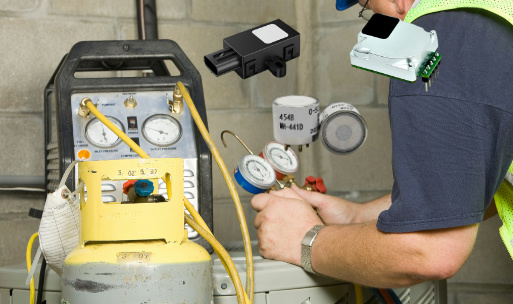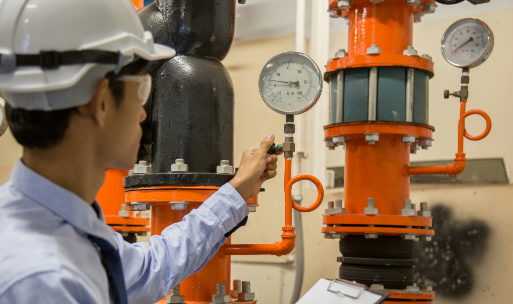MEMS Thermal Mass Gas Flow Sensor
The thermal mass gas flow sensor is a type of sensor based on the principle of heat transfer, which uses the thermal principle of MEMS to monitor the mass flow of gas in the pipeline.
The flow chip is composed of two thermocouple elements or temperature sensors and a heating resistor or heating element. The temperature sensors are symmetrically distributed upstream and downstream of the heating element. The hot junctions of the heating element and the thermocouple stacks are fixed on an insulating base. The measurement principle of thermal mass flow sensors relies on the heat transfer between the sensor’s heater and the flowing medium.

The heating resistor heats the hot junction of the thermocouple stack, and the temperature gradient between the hot and cold junctions results in an analog output voltage. When the fluid is stationary, the temperature on symmetrical sides of the heating resistor is the same; when the fluid flows from right to left, the isotherm line is inclined to the left, and the temperature on twos sides of the heating resistor is no longer the same, and the temperature difference can be measured by thermocouple stacks on both sides of heating resistor.
Since the heat transfer of the fluid is only related to the fluid mass and the heat capacity of the fluid, the sensor can directly measure the fluid mass flow. Gas mass flow are generally measured in SCCM (Standard Cubic Centimeter per Minute) and SLM (Standard Liter per Minute), that is, standard milliliters per minute and standard liters per minute.
Features of Thermal Mass Flow Sensors
1)The thermal mass gas flow sensor uses a simple structure and MEMS sensors. Small size, Low power consumption, and easy use.
2)It has the advantages of small pressure loss, and wide range of temperature and pressure.
3)It can accurately measure the micro flow rate, and the large flow rate by using the split device. Can be used for the proportional control of different gases. Automatic flow control can also be realized.
4)No-drift, fast response, excellent stability and great repeatability in a long period of use;
5)temperature compensation and calibrated.
6)Besides, the chip used in Winsen gas flow sensors is of the latest technology, capable to resist shock and pollution.
Wide range of applications:
It is widely used to measure non-corrosive, non-strong acid and strong alkali gases in industrial process control, dust particles counter, automated control, medical equipment, portable instruments, air quality sampling, and environmental monitoring equipment.


| Model | FR03 | FR03H | FR06 | FR15 |
| Photo |  |
 |
 |
 |
| Normal range(SLM) | 0.1/0.2/0.3/0.5 | 1/2/3/4/5 | 10/15/20 | 0-300 |
| Nominal Diameter (DN) | DN3 | DN6 | DN15 | |
| Output signal | Linear 1-5V/0.5-4.5V | Linear 1-5V/0.5-4.5V or digial IIC | Linear analog voltage or digial IIC | |
| Working voltage | DC5V-14V | |||
| Accuracy | ±(2±0.5FS)% | ±(2±0.5FS)% | 0-9SLM ±0.5SLM; 9-300SLM ±2.5%FS |
|
| Working pressure | Customizable | ≤200Kpa | Customizable | / |
| Working Temperature | 0℃~50℃ | 5℃~60℃ | ||
| Storage temperature | -20℃~80℃ | |||
| Measurement Medium | dry,clean, non-corrosive gas | |||
| Electrical interface | 2.54mm-5P pins or PH2.0-5P terminal (optional) | Molex 87832-1010 | ||
| Mechanical interface | / | ISO3mm | φ6-G1/8 Pneumatic plug |
/ |
| Model | FR20 | F1012 | F1031 | F1031V |
| Photo |  |
 |
 |
 |
| Normal range(SLM) | 150/200/300 | 0.03/0.05/ 0.1/0.2/0.3/0.5/1 |
50/100/150/200/300 | 100/150/200/300 |
| Nominal Diameter (DN) | DN20 | DN3 | DN20 | |
| Output signal | LLinear 1-5V/0.5-4.5V or digial IIC | Linear 1-5V/0.5-4.5V | Linear 0.5-4.5V | |
| Working voltage | DC5V-14V | DC7V-14V | DC7V-14V | DC5V-14V |
| Accuracy | ±(2±0.5FS)% | ±2.5%FS | ±2.5%FS | ±4%FS |
| Working pressure | ≤200KPa | ≤200KPa | ||
| Working Temperature | 0℃~50℃ | 0℃~50℃ | ||
| Storage temperature | -20℃~80℃ | -20℃~80℃ | ||
| Measurement Medium | dry,clean, non-corrosive gas | |||
| Electrical interface | PH2.0-5P terminal | 2.54mm-5P pins | PH2.0-5P terminal | |
| Mechanical interface | ISO20mm | ISO3mm | ISO20mm | |





